| Article ID | Journal | Published Year | Pages | File Type |
|---|---|---|---|---|
| 3468263 | European Journal of Internal Medicine | 2010 | 4 Pages |
BackgroundOral anticoagulant therapy with vitamin K antagonists is associated with an increased risk of bleeding, particularly gastrointestinal bleeding. It remains unclear, however, whether use of these medications is a risk factor for subarachnoid haemorrhage (SAH). We therefore examined the association between oral vitamin K antagonist use and risk of SAH.MethodsWe conducted this population-based case-control study using medical databases in Northern Denmark (population 1,150,000). We identified 1188 patients admitted to neurologic or neurosurgical departments with a first-time diagnosis of SAH between 1996 and 2008 and 11,880 population controls. We obtained information on use of vitamin K antagonists, other medication use, and comorbidity. We used logistic regression analysis to compute odds ratios (ORs) comparing oral anticoagulant users and non-users, controlling for potential confounding factors.Results9 cases (0.8%) and 157 controls (1.3%) were current users of vitamin K antagonists (at least one prescription filled within 90 days of the diagnosis/index date). Current use of vitamin K antagonists was not associated with increased SAH risk compared with non-use [adjusted OR = 0.80 (95% CI: 0.37–1.74)]. Changing the exposure window from 90 days to 120 days or to 60 days before the diagnosis/index date did not change the estimate substantially.ConclusionWe found no evidence to support an association between use of vitamin K antagonists and increased SAH risk.
